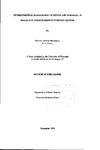ENVIRONMENTAL MANAGEMENT IN DEVON AND CORNWALL'S SMALL AND MEDIUM-SIZED ENTERPRISE SECTOR
| dc.contributor.author | Hutchinson, Michael Andrew | |
| dc.contributor.other | Plymouth Business School | en_US |
| dc.date.accessioned | 2013-11-04T12:57:18Z | |
| dc.date.available | 2013-11-04T12:57:18Z | |
| dc.date.issued | 1994 | |
| dc.identifier | NOT AVAILABLE | en_US |
| dc.identifier.uri | http://hdl.handle.net/10026.1/2575 | |
| dc.description.abstract |
The challenge of sustainable development has become one of the most important strategic, economic and social concerns facing global society today. Although literature on environmental management theory and sustainable development philosophy has increased apace throughout the 1980s and 1990s, very few of these writings have documented the case of the small and medium-sized enterprise (SME). The objectives of this research are: i) to determine the level of awareness and perception of environmental issues within the SME sector and to assess prevailing attitudes of owner/managers to the importance they attach to managing this aspect of their business operations; ii) to gain an understanding of the scale and nature of response to environmental issues across a broad section of SMEs; iii) to utilise the knowledge gained about awareness, attitude and organisational response to assess the relevance of the environmental management systems so far developed to and to link this to achieving sustainable development; iv) to draw upon the expertise of owner/managers and appropriate institutions to validate and, if appropriate, further refine the new and/or revised systems as necessary; v) to assess the possibilities for sustainable development within the SME sector. The first phase of the research involves a mail survey which identifies: what the SME sector is doing to improve its environmental performance; what the general attitudes to organisational change are: and levels of awareness of various environmental issues. Phase two of the research considers in more depth the issue of practical response to environmental issues through a series of in-depth interviews concentrating particularly on reasons why companies do not have detailed strategic management plans to deal with the environment. Phase two tests the results from the in-depth interviews on a larger sample frame providing the empirical foundations for testing existing models of environmental management. Phase three of the research analyses the need for an alternative strategy for the SME sector to manage environmental concerns. Material for a new model is obtained from case study material of best practice, alternative literature and primary source information. Results show that existing models are inappropriate for the majority of SMEs and that environmental practices are limited within the sector. Awareness of environmental issues and attitudes towards change are more positive from larger secondary sector companies. To this end the research proposes an alternative Bioregional Regeneration Model which could be tested and applied to induce local community regeneration and the development of a sustainable community based SME sector. | en_US |
| dc.language.iso | en | en_US |
| dc.publisher | University of Plymouth | en_US |
| dc.title | ENVIRONMENTAL MANAGEMENT IN DEVON AND CORNWALL'S SMALL AND MEDIUM-SIZED ENTERPRISE SECTOR | en_US |
| dc.type | Thesis | |
| plymouth.version | Full version: final and full version as approved by the examiners at the time of the award of your degree | en_US |
| dc.identifier.doi | http://dx.doi.org/10.24382/3264 | |
| dc.identifier.doi | http://dx.doi.org/10.24382/3264 |
Files in this item
This item appears in the following Collection(s)
-
01 Research Theses Main Collection
Research Theses Main


